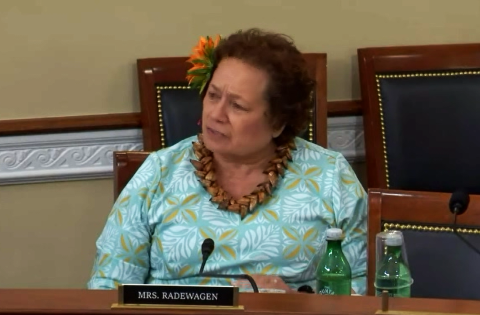Amata Emphasizes Fishing Industry to Secretary Haaland, Asked for Administration’s Economic Plan
Washington, D.C. – Congresswoman Uifa’atali Amata emphasized the importance of American Samoa’s fishing industry to Secretary of the Interior Deb Haaland in a hearing Wednesday in the Natural Resources Committee, including the jeopardy that a massive new Marine Sanctuary could cause. She pointed out that the administration has not provided a status update on the Marine Sanctuary since NOAA held meetings last September, and asked for the Biden Administration to provide their economic plan for the territory if their major new limits on fishing were to lead to the cannery closing.

Amata in hearing speaking with Secretary Haaland
“American Samoa’s first cannery many decades ago was built with support from a DOI initiative to kickstart our economy. Now StarKist is second only to the local government as an employer,” said Congresswoman Amata. “Unfortunately, our fishing industry and our self-sufficiency is now under existential pressure from over-zealous and short-sighted green politics. As part of President Biden’s 30X30 initiative, the administration has a pending Marine Sanctuary proposal covering the area around the Pacific Remote Marine Island Monument. The monument was already doubled in size by the Obama administration, and with this expansion, 777,000 square miles of tuna fishing grounds which supply our cannery will be subject to multiple layers of environmental oversight. To put that in perspective, that is over four times the size of California. Our natural resources are already protected under the Magnuson Stevens Act and adding another layer of bureaucracy adds no further protection. Expanding the monuments without allowing for commercial fishing will devastate American Samoa’s economy,” Amata warned.
The Congresswoman also highlighted important areas of cooperation and support from the Department, thanking the Secretary for efforts by the Office of Insular Affairs (OIA) in general, and for the specific support and testimony of Assistant Secretary Cantor and Deputy Assistant Secretary Nakoa on behalf of Amata’s bill, H.R. 6062, which would provide the people of the territory more self-determination in amending the American Samoa constitution.
Amata also discussed fiscal year 2025 proposal for the American Samoa Operations Account, noting that “the stated goal of OIA’s assistance to the territories is to offset the difficulties caused by our geographic and economic isolation and encourage our island’s eventual self-sufficiency.”
“I will be requesting report language directing no less than $3 million from the operations account be allocated to the American Samoa Community College,” Amata continued.
Secretary Haaland assured of her dedication to oversight responsibility for funding, and her desire to work with the territory on economic concerns.
Amata’s statement concluded, “The territories do not want to be a charity case, and we will invest in education and our island’s future leaders and business owners. We will work to make every dollar count, and we need Interior to ensure the money is going where it needs to go. However, I assure you that if the fishing industry fails in American Samoa, the long-term cost to the federal government will increase exponentially. Instead of our little $28 million buffer account, the territory will instead require hundreds of millions in federal assistance as our island drops even further below the poverty line.”
A video clip of Amata’s statement and questions is available HERE.
This week, the House also passed the following bills:
H.R. 7987 – Plain Language in Contracting Act. The bill ensures that federal contracting opportunities are written in plain language, making it easier for small businesses to secure government contracts.
H.R. 4755 – Privacy Enhancing Technology Research Act. The bill directs the National Science Foundation (NSF) to conduct fundamental privacy research to mitigate individuals’ privacy risks in data sets while maintaining fairness, accuracy, and efficiency. The bill supports research, workforce development, standard setting, and government coordination for the development of privacy.
H.R. 6093 – Weather Act Reauthorization Act of 2023. The bill improves NOAA’s weather research, and supports improvements in weather forecasting and prediction. It reauthorizes many of the activities and programs established by the Weather Research and Forecasting Innovation Act of 2017 and addresses research gaps identified since.
###